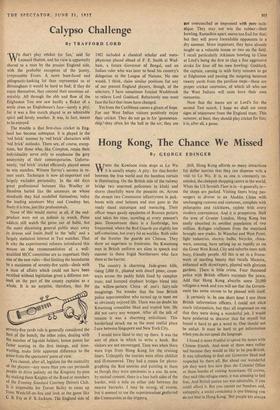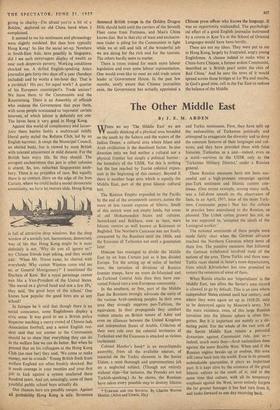Hong Kong, The Chance We Missed
By GEORGE EDINGER
WHEN the Kowloon train stops at Lo Wu it is usually empty. A pity : for that border between the free world and the bamboo curtain is illuminating. On the British side of the railway bridge two unarmed policemen in khaki and shorts cheerfully wave the peasants on. Across the stream two Communist infantrymen in jack- boots with steel helmets and sten guns at the ready stand statuesque and menacing. Their officer wears gaudy epaulettes of Russian pattern and takes his time, scowling at every peasant's pass. Downstream there is a footbridge, less frequented, where the Red Guards are slightly less self-conscious, but every bit as warlike. Both sides of the frontier the guards are Chinese. They show no eagerness to fraternise; the Kwantung men in British uniform are alien in speech and manner to those frigid Northerners who face them at the barrier.
The country is charming. Jade-green hills, rising 2,000 ft., planted with dwarf pines; cause- ways across the paddy fields lined by camphor trees; and humped elephant bridges blend into the willow-pattern China of one's fairy-tale imaginings. No wonder that the lone British police superintendent who turned up to meet me so obviously enjoyed life. There was no doubt his Kwantung constables liked and trusted him. He did not carry any weapon. After all the talk of tension it was a charming anticlimax. This borderland struck me as the most restful place I saw between Singapore and New York City.
I would have liked to stay up there. It was the sort of place in which to write a book. But visitors are not encouraged. Time was when there were trips from Hong Kong for the cruising liners. Unhappily the tourists were often childish and ill-mannered. They had a mania for photo- graphing the Red sentries and pointing at them as though they were specimens in a zoo. So now, by mutual consent, there is a ban both sides of the border, with a mile on either side between the nearest barracks. I may be wrong, of course, but it seemed to me the superintendent preferred the Communists to the trippers, Still, Hong Kong affords so many attractions for dollar tourists that they can dispense with a visit to Lo Wu. It is, as one is constantly re- minded, the cheapest shopping centre in the world. When the US Seventh Fleet is in—it generally is— the shops are packed. Visiting liners bring pas- sengers in droves to an Aladdin China with unchanging customs and costumes, complete with palanquins and rickshaws, replete with every modern convenience. And it is prosperous. Half the area of Greater London, Hong Kong has easily absorbed its swollen population of two million. Refugee craftsmen from the mainland brought new trades. In Wanchai and West Point, light industries, electric. bulbs, bicycles, china- ware, canning, have sprung up as rapidly as on the Great West Road. City and suburbs teem with busy, friendly people. All this is set in a frame- work of startling beauty that recalls Madeira, enhanced with skyscrapers, planted with glorious gardens. There is little crime. Four thousand police with British officers maintain the peace. Add that Hong Kong absorbs some 20,000 refugees a week and you will see that the Govern- ment has some excuse to be pleased with itself.
It certainly is. In one short hour I saw three British information officers. I could not elicit much information, but they all impressed on me that they were doing a wonderful job. I would have preferred to discover that for myself but found it hard to get a word in. One should not be unfair. It must be hard to get information when you do not speak the language.
I found it more fruitful to spend the hours with Chinese friends. And most of them were rather sad because they would so like to be pro-British. It was refreshing to find our Governor liked and respected by them all. But about our wonderful job they were less sure than the Colonial Office or those hordes of visiting Americans. Of course, they said (the refugee ones), it was amazing to feel free. And British justice too was admirable, if you could afford it. But you cannot eat freedom and, unhappily, a social conscience is one blessing you • do not find in Hong Kong. 'But people are always giving to charity—I'm afraid you're a bit of a Bolshie,' deplored an old China hand when I complained.
It seemed to me his sentiments and phraseology were slightly outdated. But then how typically Hong Kong! So like the social set-up. Nowhere in South-East Asia, save possibly in Singapore, did I see such extravagant display of wealth so near such desperate poverty. Working conditions shocked me. A skilled English-speaking Asian journalist gets forty-two days off a year (Sundays included) and he works a ten-hour day. That is a yardstick! His pay, for equal work? A quarter of his European counterpart's. Trade unions? We leave them to the Communists and the Kuomintang. There is an Assembly of officials who endorse the Government that pays them, with some people nominated to 'represent' certain Interests, of which labour is definitely not one. The haves have it very good in Hong Kong.
Against this world of complacency and laisser- faire there battles feebly a multiracial mildly Liberal party styled the Reform Club, led by an English barrister. It swept the Municipal Council, an elected body, but is viewed by most British with tolerant amusement or mild distaste. For the British here enjoy life. So they should. The arrogant exclusiveness that jars in other colonies is absent. So, too, suburban Singaporean snob- bery. There is no prejudice of race. But equally there is no contact. Here on the edge of the Iron Curtain, where we could build a model democratic community, we have let matters slide. Hong Kong is full of attractive shop windows. But the shop window of a socially just, harmonious, democratic way of life that Hong Kong might be it most definitely is not. 'Why do you all ignore us?' my Chinese friends kept asking, and they would add : 'When Mr. Nixon came, he chatted with everybody. Why cannot Winston come and see us, or General Montgomery?' I mentioned the Duchess of Kent. But a royal personage cannot mix like a Vice-President of the United States. 'She waved us a gloved hand and saw a few JPs,' they said, 'the good boys of the school.' One knows how popular the good boys are at any school!
In fairness be it said that though there is no social conscience, some Englishmen display a civic sense. It was good to see a British police inspector teaching a merry crowd of Chinese lads Association football, and a senior English resi- dent said that our answer to the Communists should be to show that everything they can do In the welfare line we can do better. But when he pressed that on his colleagues at the Hong Kong Club (no race bar) they said, 'We come to make money, not to crusade.' Young British fresh from welfare England are often frankly shocked. But it needs courage in your twenties and your first job to kick against a system unaltered these hundred years. And yet, amazingly, some of these youthful public school boys actually do.
Our chances here are possibly unique. Against all probability Hong Kong is safe. Seventeen thousand British troops in the Golden Dragon Hills should hold until the carriers of the Seventh Fleet come from Formosa, and Mao's China knows that. But in that city of want and exclusive- ness tinder is piling for the Communists to light while we sit still and talk of the wonderful job we are doing for the rich and for the tourists. The others hardly seem to matter.
There is room indeed for much more labour legislation and even some labour representation. One would even like to meet an odd trade union leader at Government House. In the past few months, newly aware that Chinese journalists exist, the Government has actually appointed a Chinese press officer who knows the language. It was an opportunity mishandled. The psychologi- cal effect of a good English journalist buttressed by a course in Kuo Yu at the School of Oriental Languages would have been terrific.
These are not my ideas. They were put to me in Hong Kong, largely by frustrated, angry young Englishmen. A chance indeed to make what a China-born Chinese, a former ardent Communist, described as 'a British pearl under the chin of Red China.' And be sure the news of it would spread across those bridges at Lo Wu and maybe, in God's good time, call in the Far East to redress the balance of the Middle.



































 Previous page
Previous page